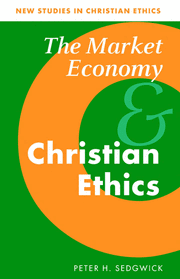Book contents
- Frontmatter
- Contents
- General editor's preface
- Acknowledgements
- Introduction
- 1 Modernity, the market and human identity
- 2 Consumerism and personal identity
- 3 The work ethic
- 4 Globalization
- 5 The response of the churches
- 6 Concluding reflections
- Notes
- Select bibliography
- Index of names and subjects
- Index of biblical references
6 - Concluding reflections
Published online by Cambridge University Press: 22 September 2009
- Frontmatter
- Contents
- General editor's preface
- Acknowledgements
- Introduction
- 1 Modernity, the market and human identity
- 2 Consumerism and personal identity
- 3 The work ethic
- 4 Globalization
- 5 The response of the churches
- 6 Concluding reflections
- Notes
- Select bibliography
- Index of names and subjects
- Index of biblical references
Summary
Three observations come to mind at the end of this book about the speed of change, the differences in theology and the involvement of the churches. The speed of change is perhaps the most striking. Reich's book, The Work of Nations, read likes an epic novel, or like ‘The Twilight of the Gods: Götterdämmerung’. In the early chapters of his book, he describes how American and European industry gradually grew out of craft industries into the mighty giants of the early twentieth century, aided by imperialism and protectionism. By the mid twentieth century, such industry employed hundreds of thousands, with corporate headquarters as grand as government buildings. They had a close relationship with government, harmonious labour relations (at least in America), a world-wide span and enormous wealth. By the end of the twentieth century, technology, world-wide competition and changing cultural tastes had reduced this mass employment to ruins. The enormous growth in unemployment in the last three decades of this century in America and Europe was not like the 1930s, for factories did not close for a while but were demolished. Those who have worked, or ministered pastorally and in Industrial Mission, in such areas in recent years know in the depths of their being what this has meant for the former industrial worker. In its place there has come the use of the service industries, global competition, new consumerism and a transformed attitude to paid employment.
- Type
- Chapter
- Information
- The Market Economy and Christian Ethics , pp. 270 - 273Publisher: Cambridge University PressPrint publication year: 1999

